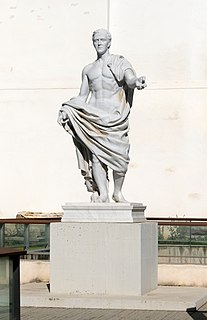Contents
| Look up lucullus in Wiktionary, the free dictionary. |
Lucullus may refer to:
| Look up lucullus in Wiktionary, the free dictionary. |
Lucullus may refer to:
This article concerns the period 69 BC – 60 BC.
80s BC is the time period from 89 BC – 80 BC.
Year 56 BC was a year of the pre-Julian Roman calendar. At the time, it was known as the Year of the Consulship of Lentulus and Philippus. The denomination 56 BC for this year has been used since the early medieval period, when the Anno Domini calendar era became the prevalent method in Europe for naming years.

Year 87 BC was a year of the pre-Julian Roman calendar. At the time it was known as the Year of the Consulship of Octavius and Cinna/Merula and the Second Year of Houyuan. The denomination 87 BC for this year has been used since the early medieval period, when the Anno Domini calendar era became the prevalent method in Europe for naming years.
Year 118 BC was a year of the pre-Julian Roman calendar. At the time it was known as the Year of the Consulship of Cato and Rex and the Fifth Year of Yuanshou. The denomination 118 BC for this year has been used since the early medieval period, when the Anno Domini calendar era became the prevalent method in Europe for naming years.
Lucius Licinius Lucullus was a Roman politician who became consul in 151 BC.

Lucius Licinius Lucullus was an optimas politician of the late Roman Republic, closely connected with Lucius Cornelius Sulla. In the culmination of over twenty years of almost continuous military and government service, he became the conqueror of the eastern kingdoms in the course of the Third Mithridatic War, exhibiting extraordinary generalship in diverse situations, most famously during the Siege of Cyzicus, 73–72 BC, and at the Battle of Tigranocerta in Armenian Arzanene, 69 BC. His command style received unusually favourable attention from ancient military experts, and his campaigns appear to have been studied as examples of skillful generalship.

The gens Licinia was a celebrated plebeian family at ancient Rome, which appears from the earliest days of the Republic until imperial times, and which eventually obtained the imperial dignity. The first of the gens to obtain the consulship was Gaius Licinius Calvus Stolo, who, as tribune of the plebs from 376 to 367 BC, prevented the election of any of the annual magistrates, until the patricians acquiesced to the passage of the lex Licinia Sextia, or Licinian Rogations. This law, named for Licinius and his colleague, Lucius Sextius, opened the consulship for the first time to the plebeians. Licinius himself was subsequently elected consul in 364 and 361 BC, and from this time, the Licinii became one of the most illustrious gentes in the Republic.
Appius Claudius Pulcher was a Roman noble, general and politician of the 1st century BC. He was the father of a number of renowned Romans, most notable: the infamous Clodius and Clodia.
Lucullan describes things related to or created by people named Lucullus, most notably Lucullus, Optimate politician of the late Roman Republic, consul and a general in the Third Mithridatic War. Due to the amount of treasure he returned to Rome, "Lucullan" is sometimes used as an adjective to signify lavishness.

Marcus Claudius Marcellus was Roman consul for the years 166 BC, for 155 BC, and for 152 BC.
Marcus Terentius Varro Lucullus, younger brother of the more famous Lucius Licinius Lucullus, was a supporter of Lucius Cornelius Sulla and consul of ancient Rome in 73 BC. As proconsul of Macedonia in 72 BC, he defeated the Bessi in Thrace and advanced to the Danube and the west coast of the Black Sea. In addition, he was marginally involved in the Third Servile War.
Publius Licinius Crassus Dives was consul in 205 BC with Scipio Africanus; he was also Pontifex Maximus since 213 or 212 BC, and held several other important positions. Licinius Crassus is mentioned several times in Livy's Histories. He is first mentioned in connection with his surprising election as Pontifex Maximus, and then several times since in various other capacities.
Licinia is the name used by ancient Roman women of the gens Licinia.
Lucius Caecilius Metellus Calvus was a Roman statesman. He was a son of Quintus Caecilius Metellus and brother of Quintus Caecilius Metellus Macedonicus. First Calvus used to be a Praetor, later a Consul and Governor of Hispania in 142 BC, where he fought, without success, against Viriathus, then he became a Proconsul of Cisalpine Gaul in 141 BC, and from 140 BC to 139 he was a Legate. Also during those years, Calvus participated in an embassy to some Eastern states.
Lucius Octavius was a Roman politician who was elected consul in 75 BC.
The Terentii Varrones a branch of the gens Terentia in ancient Rome.
Lucius Licinius Lucullus was a politician of the Roman Republic, and a member of the distinguished family of the Licinii Luculli, being the son of Lucius Licinius Lucullus. He did not, however, achieve the political success of his father and failed to hold the Consulship, reaching only the position of Praetor in 104 BC. During his Praetorship he first successfully put down a minor slave revolt in Campania before being sent to take command in Sicily during the Second Servile War. He was later relieved of his command and prosecuted for embezzlement upon his recall to Rome. Being convicted, he was banished from the city and lived the remainder of his life in exile. He is the father of the more famous Lucius Licinius Lucullus, who defeated Mithridates and Tigranes in the Third Mithridatic War.
Lucius Licinius Lucullus was the named used by men of gens Licinia in Ancient Rome. They came from the Licinii Luculli, in which the most famous member was the consul in 74 BC and conqueror of Mithridates VI of Pontus.